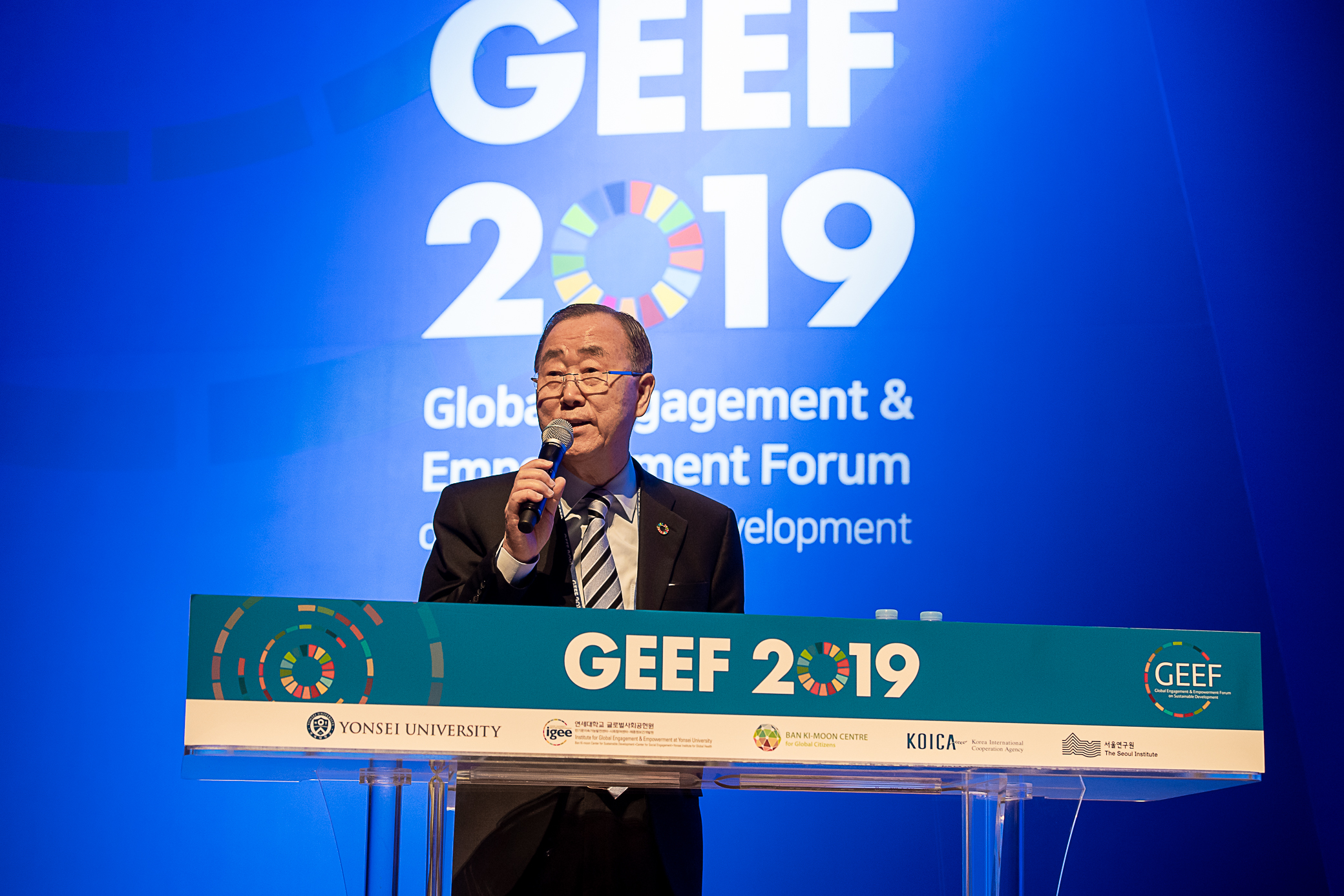- Global Leaders Engage in Sustainable Development at Yonsei University March 15, 2019
-
Global Engagement & Empowerment Forum on Sustainable Development (GEEF) 2019
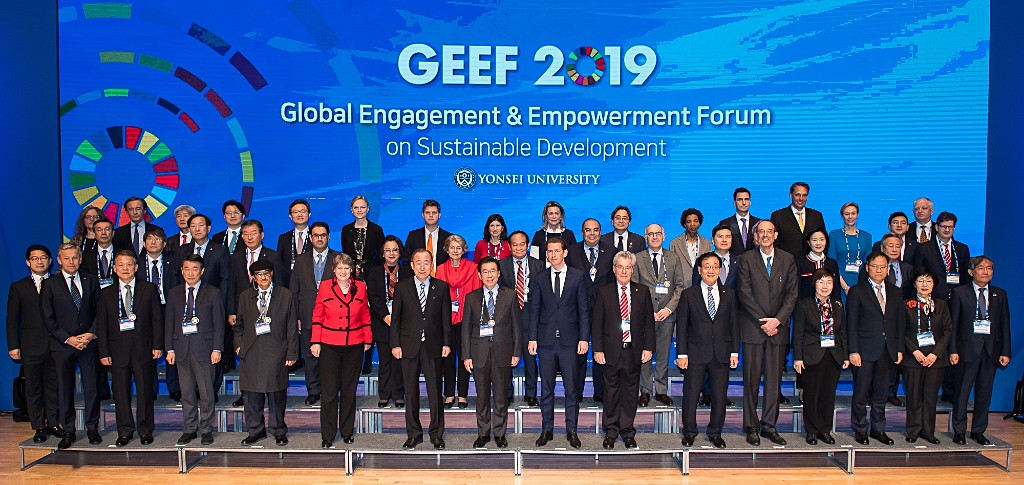
Leaders and stakeholders from around the world gathered together to discuss and address global issues to lead toward a sustainable future at the Global Engagement & Empowerment Forum on Sustainable Development (GEEF) 2019 held at Yonsei University in Seoul, Korea on February 14-15, 2019.
As an “Engaged University” committed to actively contributing towards building a sustainable future through quality education and rigorous research, Yonsei University has been the main organizer of GEEF in partnership with Ban Ki-moon, 8th Secretary-General of the United Nations and Honorary Chair of Yonsei‘s Institute for Global Engagement and Empowerment (IGEE), since the forum’s inauguration in 2018.
Under the theme, “A Call to Action: Empower People, Share Prosperity,” GEEF 2019 served as a global platform for open exchange and engagement among the wide cross-section of actors and stakeholders, including government, international organizations, academia, business, civil society, and students. Over 100 esteemed speakers from 27 nations and over 1,300 participants from over 78 countries took part in the forum to collaborate towards accomplishing the United Nation’s 2030 Agenda for Sustainable Development.
Distinguished speakers included Chancellor of Austria Sebastian Kurz, 11th President of Austria Heinz Fischer, 37th Prime Minister of New Zealand Helen Clark, UNESCAP Executive Secretary Armida Alisjahbana, UNFPA Executive Director Natalia Kanem, 10th Director-General of UNESCO Irina Bokova, President of Chinese artificial intelligence startup SenseTime Michael Wen Zhang, Mayor of Seoul Park Won-soon, and President of KOICA Lee Mi-kyung.
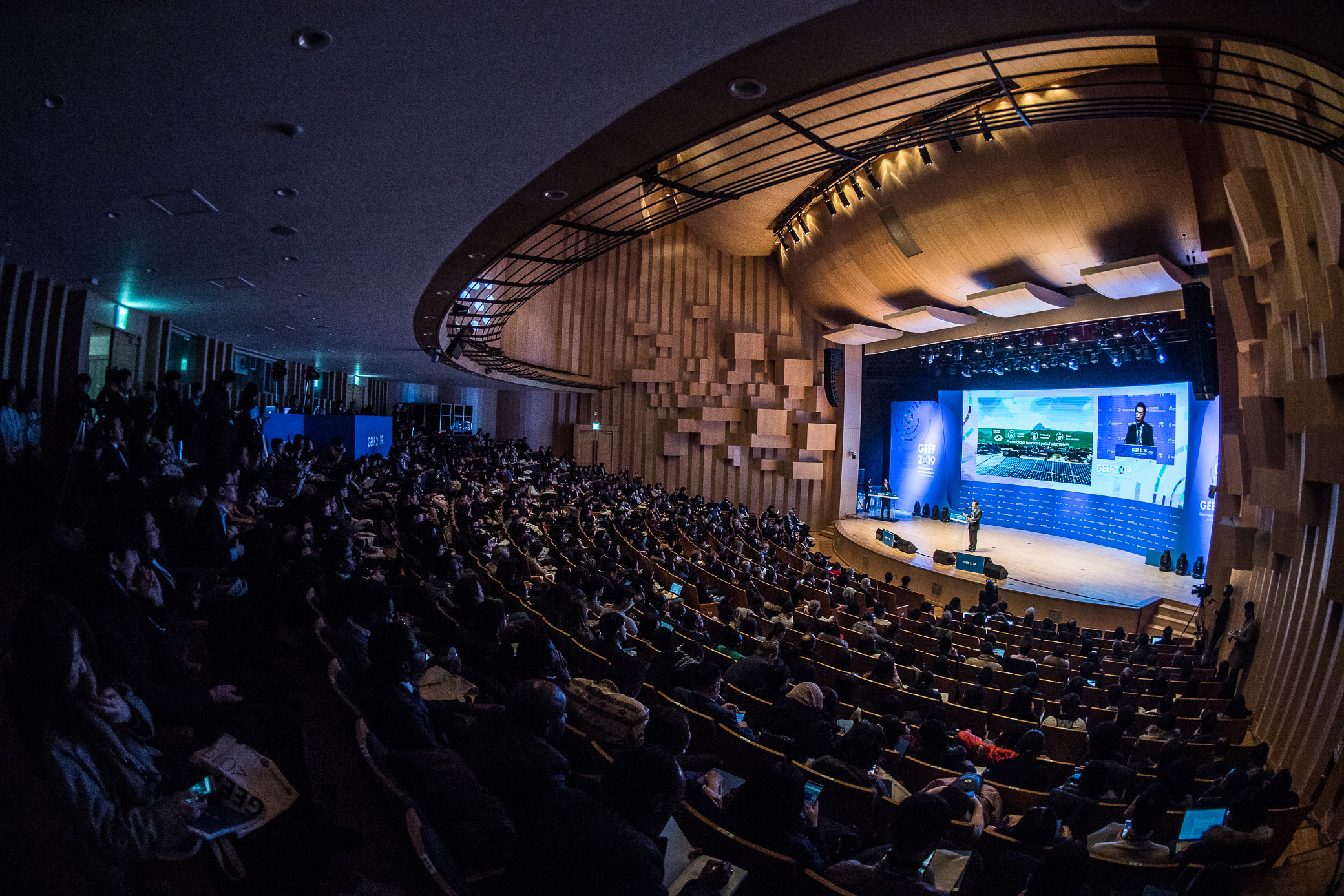
The forum was co-hosted by Yonsei University’s IGEE, Ban Ki-moon Centre for Global Citizens, KOICA, and The Seoul Institute. For two days, GEEF 2019 held plenary sessions, roundtables, and parallel sessions that covered social, economic and environmental topics which lead progress towards humankind advancements and sustainable development, including women’s empowerment, health equality, inter-Korean economic cooperation, sustainability and future cities, and financing for the Sustainable Development Goals (SDGs).
SDGs as a compass in a rapidly changing era
The Opening Ceremony took place at the Centennial Hall of Yonsei University in the morning of February 14, featuring welcome remarks by the GEEF 2019 co-hosts followed by keynote speeches on sustainability delivered by Chancellor of Austria Sebastian Kurz and Mayor of Seoul Park Won-soon.
During welcome remarks, Yonsei University President Kim Yong-Hak observed that humanity is experiencing new challenges and these challenges come with a demand for innovative and integrated solutions. He emphasized that universities should become the focal point for achieving the SDGs, as they “have the power as academic institutions that can look ahead, mobilize knowledge, and be the truth-seekers in the age of sustainable development.”
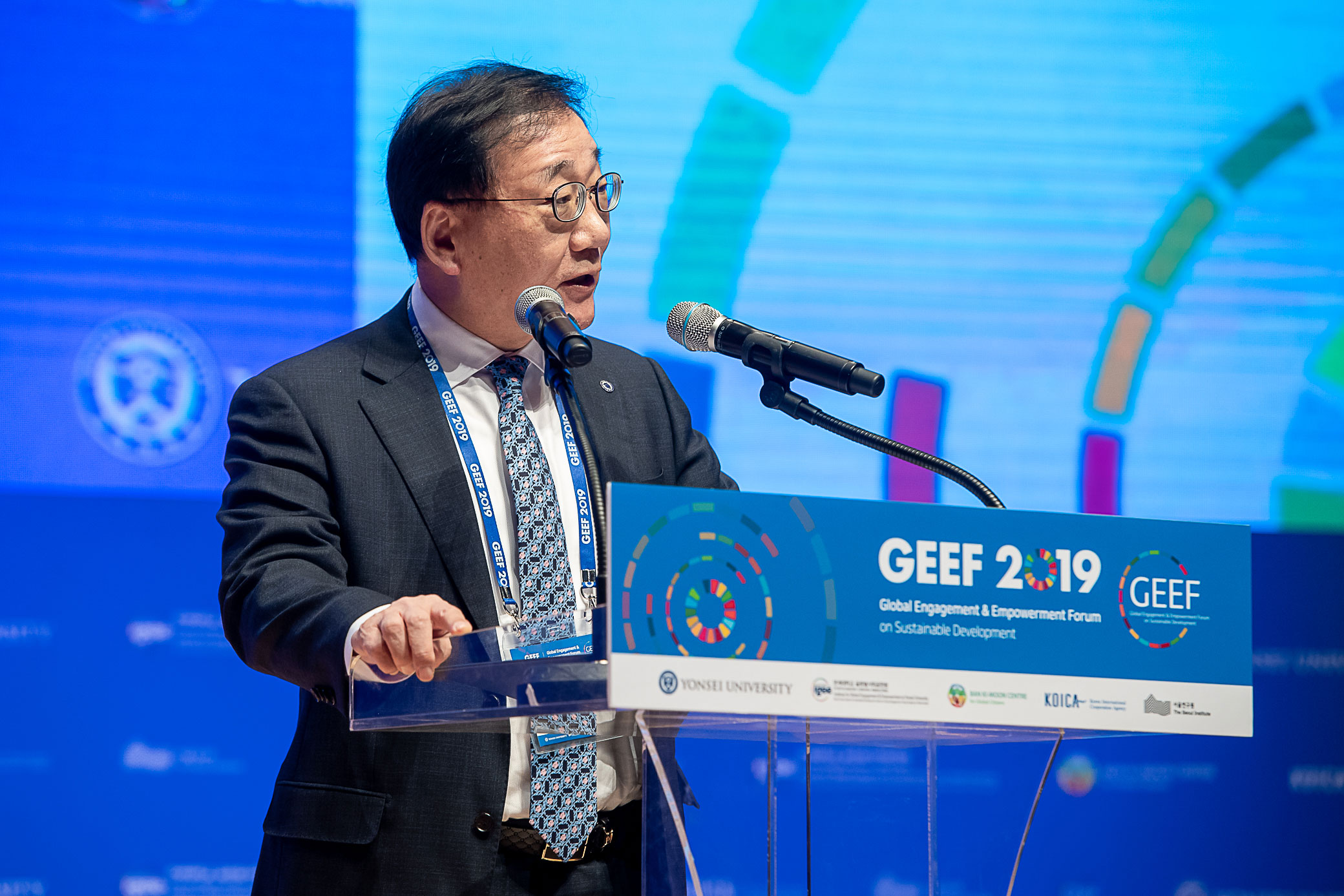 Kim Yong-Hak, President of Yonsei University
Kim Yong-Hak, President of Yonsei University President of KOICA Lee Mi-kyung then took the stage, announcing the importance to pursue gender equality, human rights, and peace throughout the cooperation process that aids developing countries to escape poverty. “The claim that there can be no sustainable development without achieving gender equality is now supported by numbers and evidence in reports published by the United Nations and international financial organizations,” she said. “KOICA will lead the way in international development cooperation by promoting its 4P system (People, Peace, Prosperity, Planet), as well as supporting women's participation and capacity-building as important factors in achieving sustainability.”
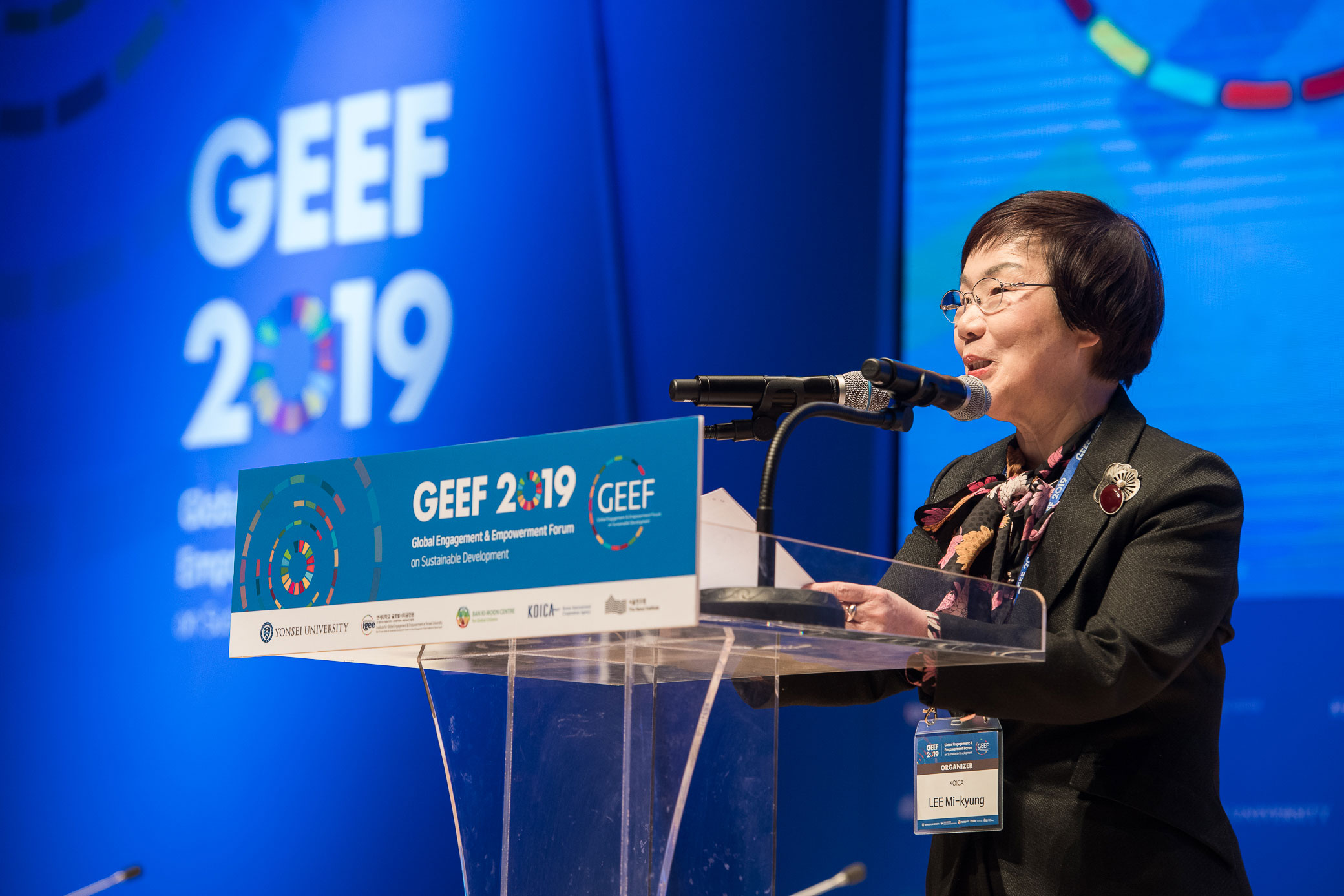 Lee Mi-kyung, President of KOICA
Lee Mi-kyung, President of KOICA During the forum’s first keynote speech, Austrian Chancellor Sebastian Kurz emphasized economic success as the prerequisite for maintaining long-term national competitiveness and a social welfare state model that can contribute to sustainable development. He added that the world must create a society with strong legal and social regulations for common goals such as peace, justice, and prosperity. Regarding the SDGs, Chancellor Kurz expressed a holistic view and called for expanded international cooperation, commenting that they can serve as a compass that shows the world the right direction in this rapidly changing era.
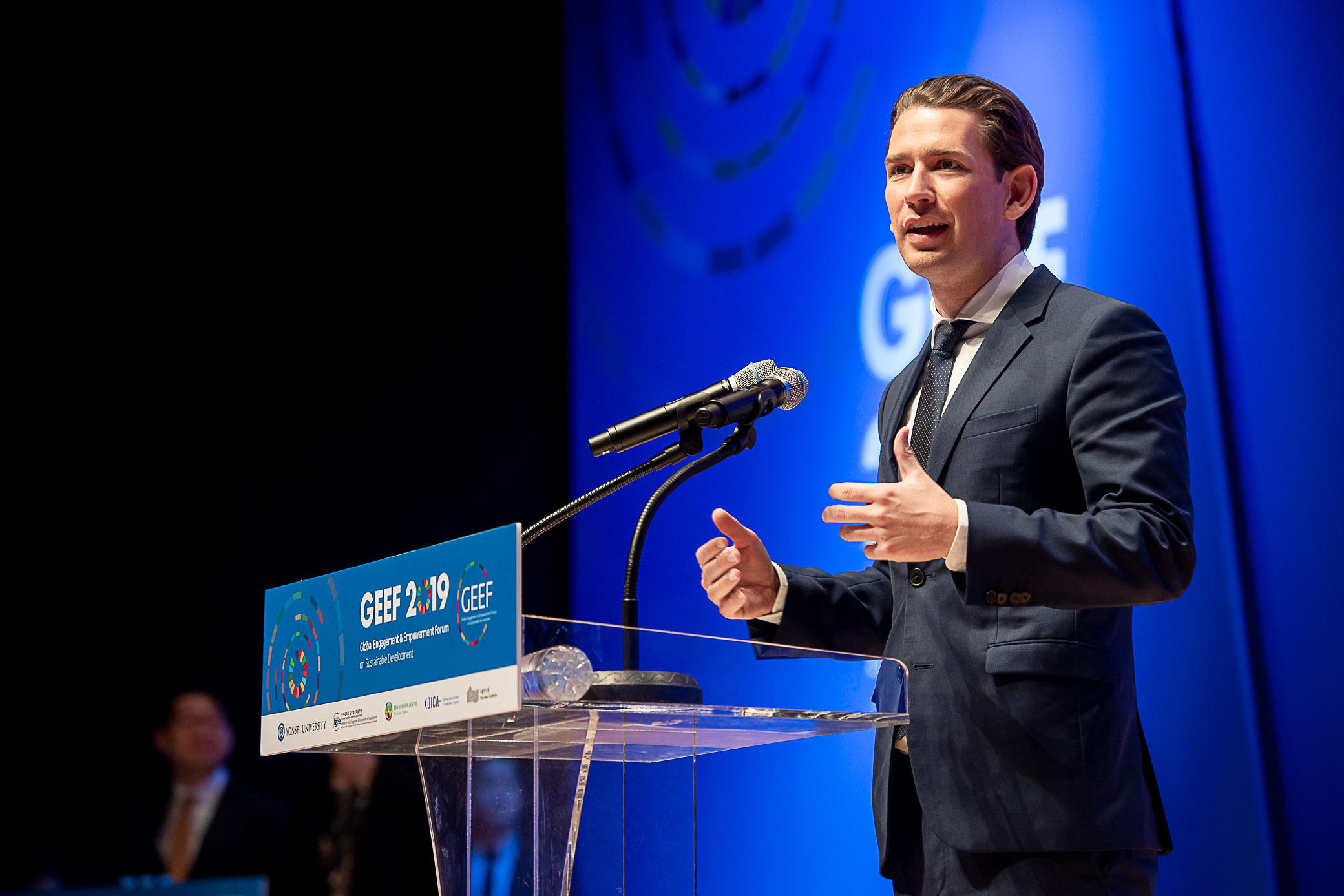 Sebastian Kurz, Austrian Chancellor
Sebastian Kurz, Austrian Chancellor Mayor of Seoul Park Won-soon announced during his keynote speech that sustainable development marks both the beginning and end of all policies in Seoul. “We will achieve our policy goals for sustainable development by moving away from the old paradigm that forced certain generations to make sacrifices in the name of quantitative growth,” he said. Mayor Park introduced several sustainable policies of Seoul such as the reduction of the number of nuclear power plants and the eco-mileage system. “The city of Seoul is now going to be less hardware and more software-oriented, and will strive for inclusive growth,” he said. “We look forward to 2030 Seoul, leading the way to achieve the SDGs.”
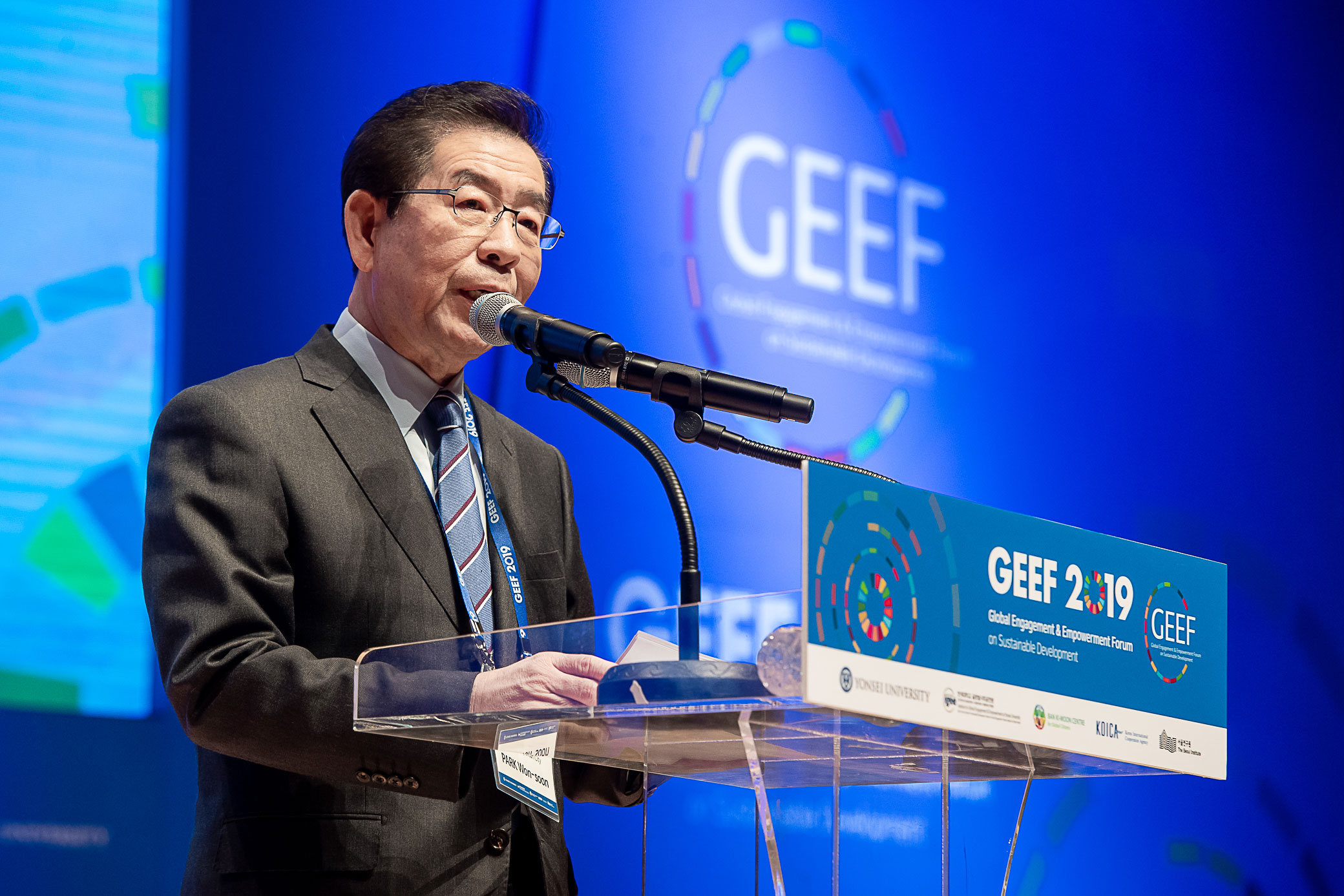 Park Won-soon, Mayor of Seoul
Park Won-soon, Mayor of Seoul Universal healthcare that leaves no one behind
Plenary sessions were held after the opening ceremony of GEEF 2019, beginning with a session on health, “The Innovation Action to Leave No One Behind.” Panelists including Honorary Chairman Ban Ki-moon, UNFPA Executive Director Natalia Kanem, and World Bank Group Senior Vice President Mahmoud Mohieldin, led a discussion on universal health coverage in the future.
Honorary Chairman Ban opened the session by remarking that universal healthcare is a fundamental right. “Strategies to curb overwhelmingly increasing health expenditures by introducing proper and transparent reimbursement by health insurance systems may be beneficial to relocate resources otherwise wasted, for health services for the poor,” he stated. He posed important questions for the panelists while emphasizing that it is important for the leaders of state to assign priority to these health issues which must be examined by political practitioners and experts.
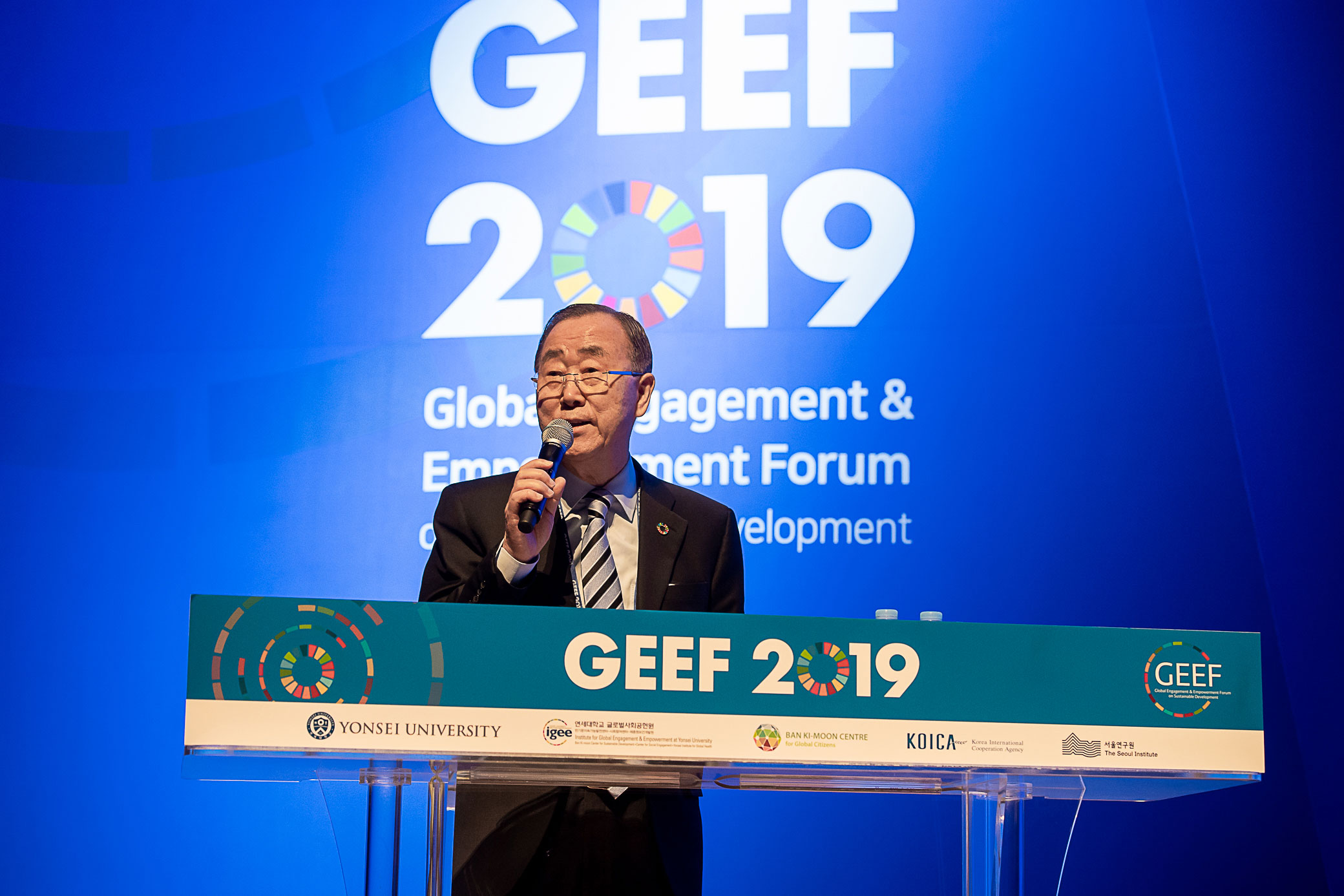 Ban Ki-moon, Honorary Chairman of IGEE at Yonsei University
Ban Ki-moon, Honorary Chairman of IGEE at Yonsei University World Bank Group Senior Vice President Mahmoud Mohieldin continued the discussion on the importance of expanding universal health coverage. He introduced the World Bank’s Human Capital Project, which was launched from a very economic-focused approach where human capital is the highest component when countries progress and the three main indicators of investing in human capital are health, survival, and school. Senior Vice President Mohieldin added that the global community needed to find ways to connect healthcare with the entire social security system by improving support and coverage through cooperation between domestic and foreign institutions. “Innovation in the private sector can have a significant impact on the health sector too,” he said.
Princess Nothemba Simela, Assistant Director-General for Family, Women and Children and Adolescents of WHO, said that inequality in healthcare is a major concern for the WHO, noting that inequality is particularly deepening in sub-Saharan countries and we must ensure that health reaches people who need it the most. “It is not easy for low-income countries to build roads or big hospitals, but with the Fourth Industrial Revolution, I think it is possible with the many technologies of developed countries to reach all over the world,” she said, remarking that we can provide health coverage strategically through health education and redesigning basic medical services.
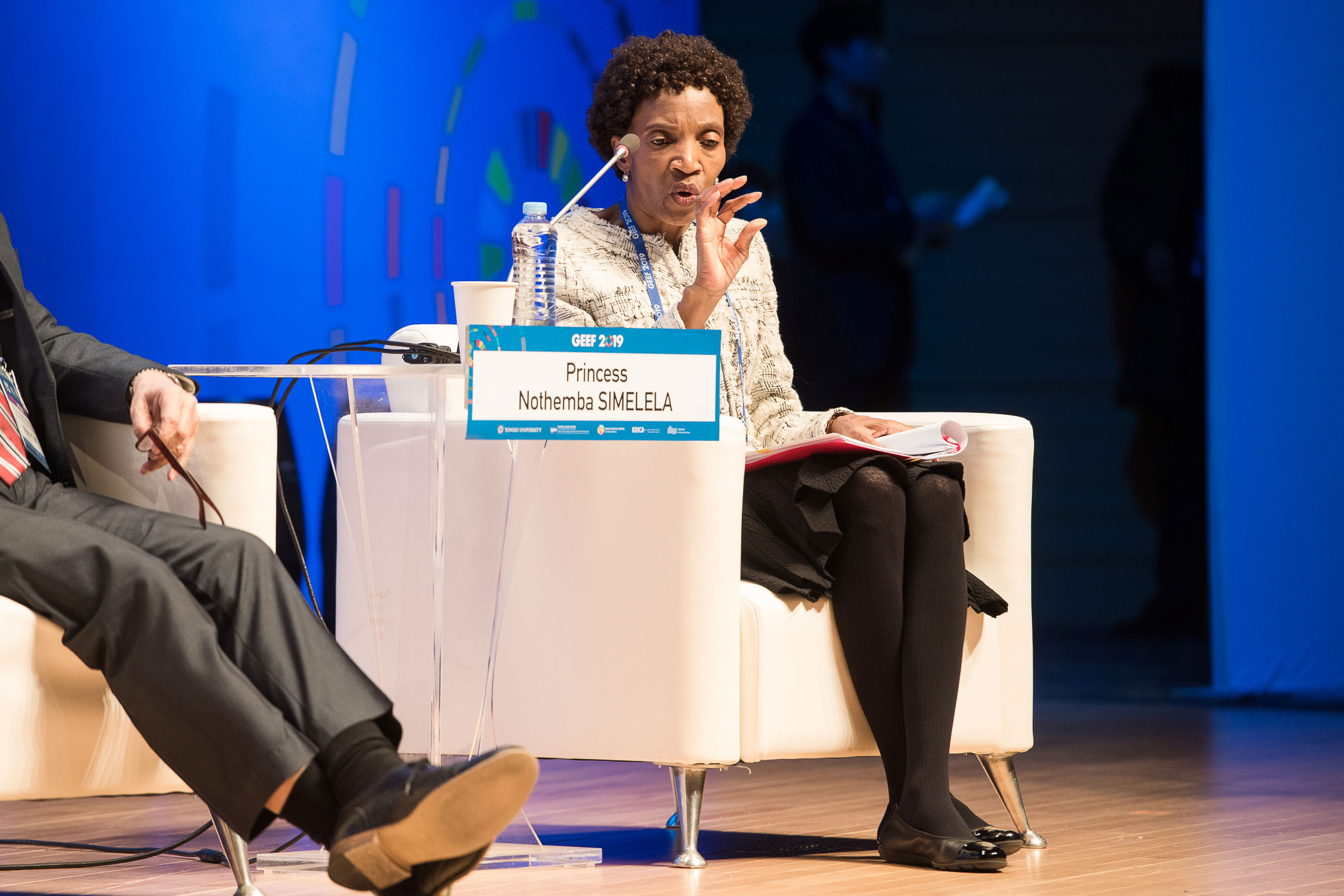 Princess Nothemba Simela, Assistant Director-General for Family, Women
Princess Nothemba Simela, Assistant Director-General for Family, Women
and Children and Adolescents of WHOMyint Htwe, Union Minister for Health and Sports of the Republic of the Union of Myanmar, remarked in Myanmar, medical inequalities in rural areas with low literacy rates are especially serious. He explained about medical services in Myanmar utilizing tablets with instructions from the Health Ministry such as safe childbirth. Minister Htwe emphasized community engagement in the design and financing of universal health coverage service system, concluding that the government needs to listen to the people to see what they need in specific areas and to strategize how it can meet their needs.
See the full video here.
Women’s empowerment for sustainable development
“SDG5 Advocacy Ceremony,” a special calligraphy performance held during GEEF 2019 highlighted the importance of gender equality and unity. Accompanied by the sounds of traditional Korean drums and instruments, calligrapher Sang-hyun Lee showcased his mastery by painting a Korean translation of the phrase “Prosperity with Women.” After the live performance, IGEE Honorary Chair Ban Ki-moon and Yonsei University President Kim Yong-Hak - along with leaders and representatives of the World Bank Group, WHO, UNESCAP, UN Women, UNFPA and KOICA – took the stage for a handprint ceremony - a symbol of promise to work together towards women’s empowerment and gender equality. The crowd joined in by chanting "Empower People, Share Prosperity," the main theme of GEEF 2019.
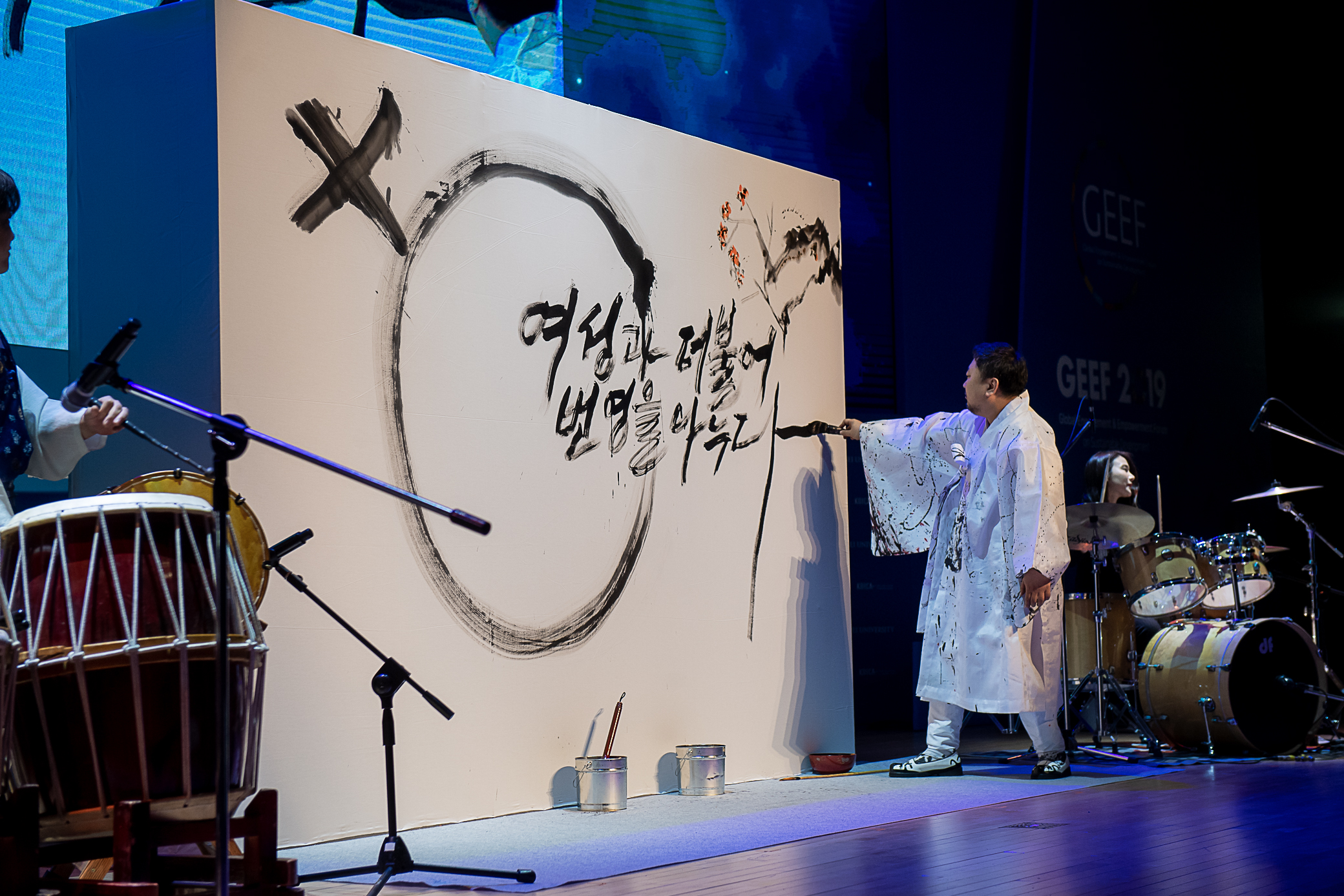
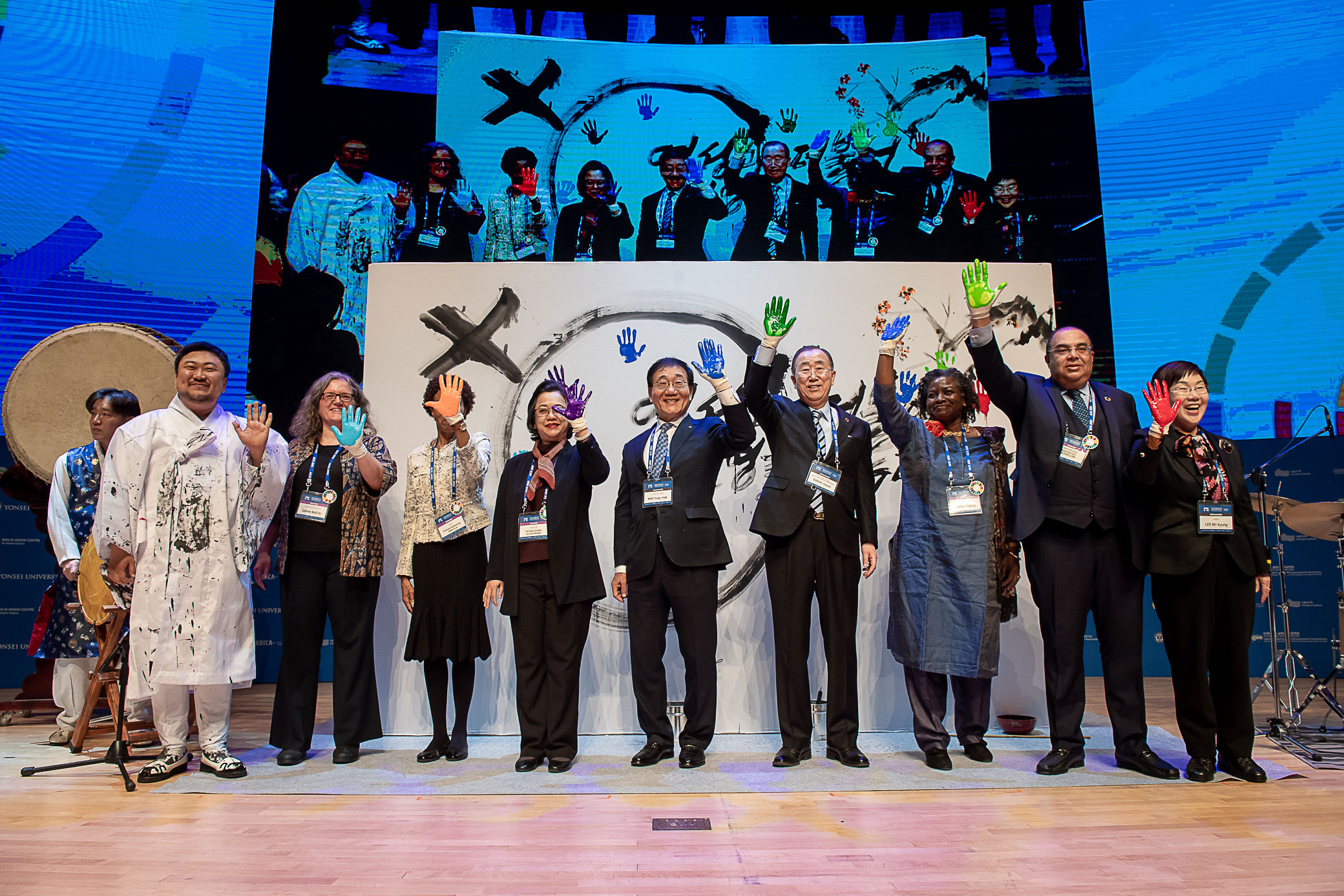
Gender Equality is the United Nations' SDG 5 and has become a key agenda item for peace and human rights in the international community. At GEEF 2019, 71st President of UN Economic and Social Council Oh Joon moderated the plenary session on women’s empowerment, which brought together six female leaders to discuss the importance of strengthening women's capacity for sustainable development.
During the panel discussion, former Prime Minister of New Zealand Helen Clark focused on the great importance of women coming forward to run for public office and hold high positions. Former Prime Minister Clark compared New Zealand - where more than 40% of all Parliament members – to the overall international community, where less than 8% of heads of state are female, stressing the world needs to create an environment where more women will be able to hold public office. “Women bring different perspectives and life experiences, and in parliament, they can address issues that weren’t effectively addressed before,” she said. She mentioned a best-practice handbook on growing political participation for women which she released in 2012 as part of a UNDP initiative, focusing on three factors: political parties must go out of their way to recruit women, women need support – both financial and physical security support - for their campaigns, and women need post-election support across parties to work together.
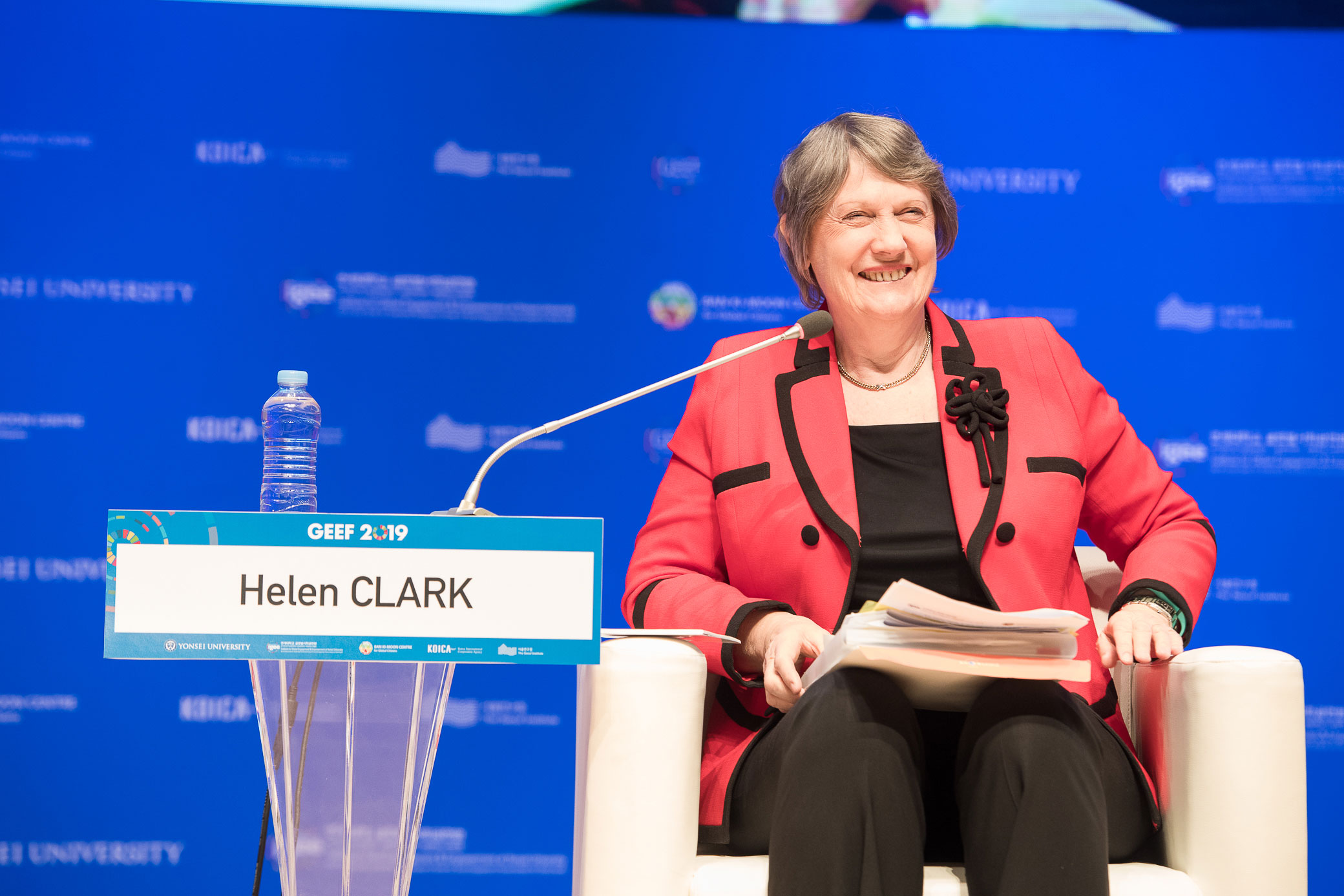 Helen Clark, 37th Prime Minister of New Zealand
Helen Clark, 37th Prime Minister of New Zealand Former UNESCO Director-General Irina Bokova, who had participated in GEEF as a panelist last year, commented that although the UN leadership has made tremendous progress around the world - according to the 2017 Gender Gap Report released by the World Economic Forum, the gender gap is increasing. She added that this issue should be addressed in a multidimensional manner from various perspectives, and efforts should be made to educate men and show them how women contribute in their lives.
Kwon Insook, President of the Korean Women’s Development Institute, continued the panel discussion by mentioning the recent women’s rights movement, as well as the current “MeToo” movement, actively taking place in Korea. “Now the (MeToo) debate of focuses more on changing the structure that keeps reproducing this kind of violence,” she said. “There is a shared understanding that gender inequality within the organization and the hierarchical structure of society is the fundamental cause.” She conveyed a message of hope, saying that the support of men is rising, and recent movements started a transformative change in society where equality and sustainability are ensured.
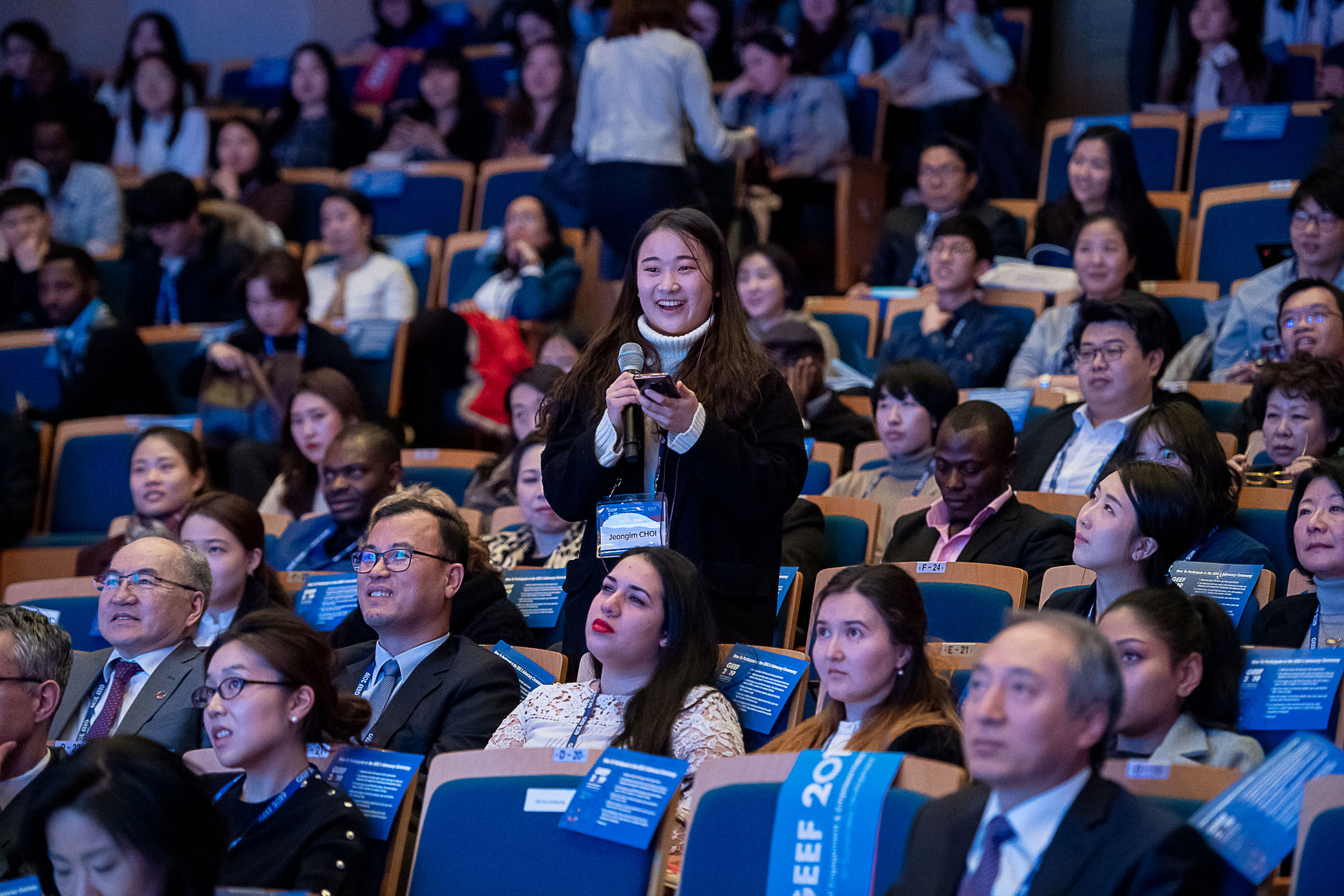
See full video here.
Constructing sustainability and future cities with technology and people
With the rapid progress and development of modern cities came critical issues such as pollution, mobility issues, and the high cost of living. For the “Sustainability and Future Cities” plenary session, five leaders in sustainable and smart cities - including University of Bordeaux President Manual Tunon De Lara and SenseTime President Michael Wen Zhang – discussed the SDG 11 (Sustainable Cities and Communities), a stand-alone goal to make cities and human settlements inclusive, safe, and resilient. Panelists discussed the concepts of future and smart cities for the future generation by connecting technology and humanity, addressing sustainability challenges and exploring possible solutions with this approach.
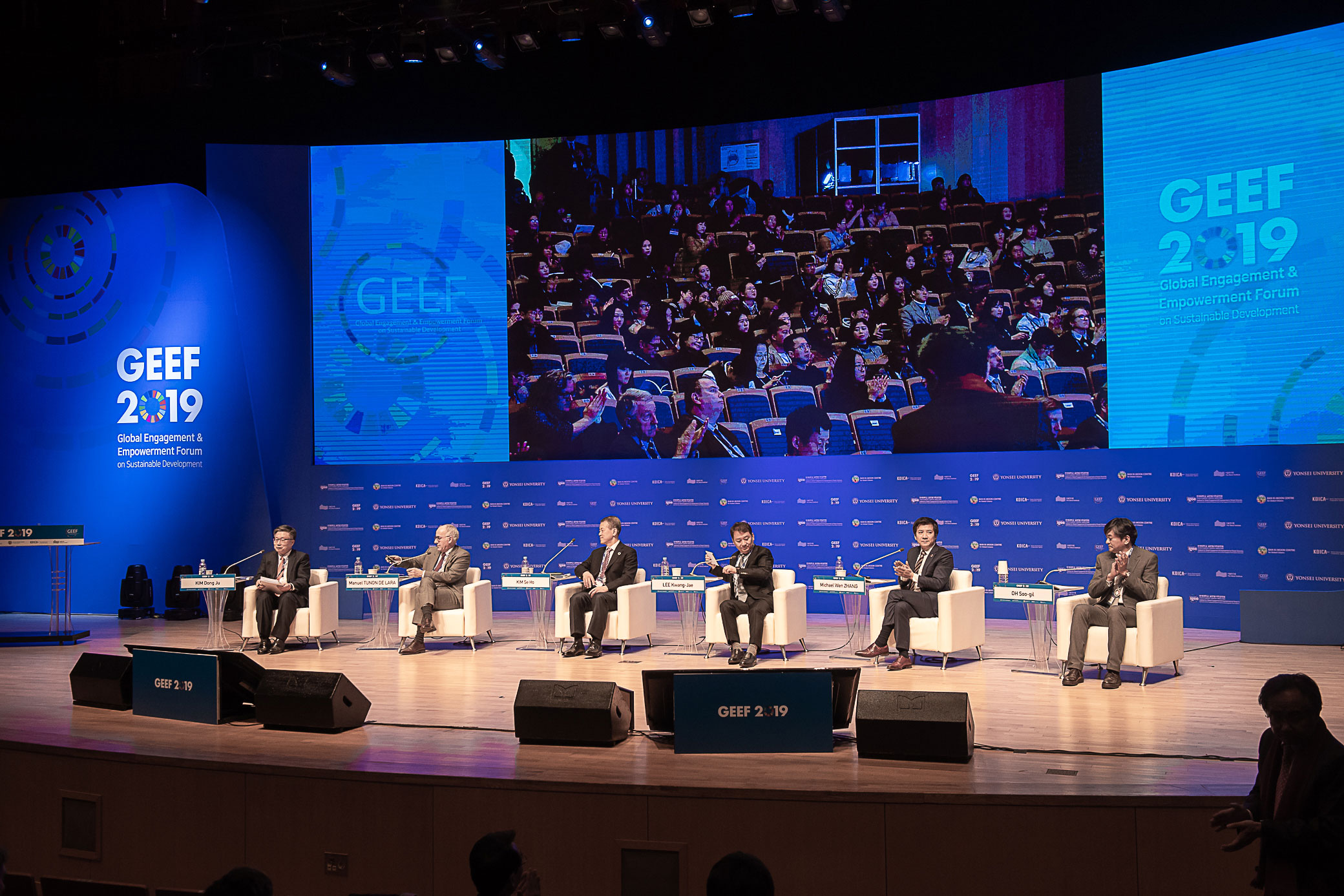
President Lee Kwang-Jae of the Future Consensus Institute initiated the concept of a new post-industrial civilization that embraces both digital technology and the well-being of humanity, focusing on the need for education for the future generation to make this future possible. “We need future education that combines digital and analog, and at the same time, we must offer optimized education which assesses a child's aptitude through AI,” he said. “We must lay the foundation of a human knowledge ecosystem that ensures the free usage, creation, and distribution of knowledge,” he remarked, concluding that providing various educational opportunities for the next generation will be the key to creating ideal future cities.
Michael Wen Zhang, President of leading Chinese AI company SenseTime, introduced beneficial people-centered technology such as 3D medical image processing, remote sensing, and autonomous driving, and expressed his agreement that smart cities are an important element of sustainable societies. President Zhang stressed that individual and corporate participation is equally important, and user experience must be involved in the analysis of technology users’ needs. He also said that it is necessary to cooperate with technology companies, citizens and governments to embrace new technology and find effective solutions to make cities more resilient and sustainable.
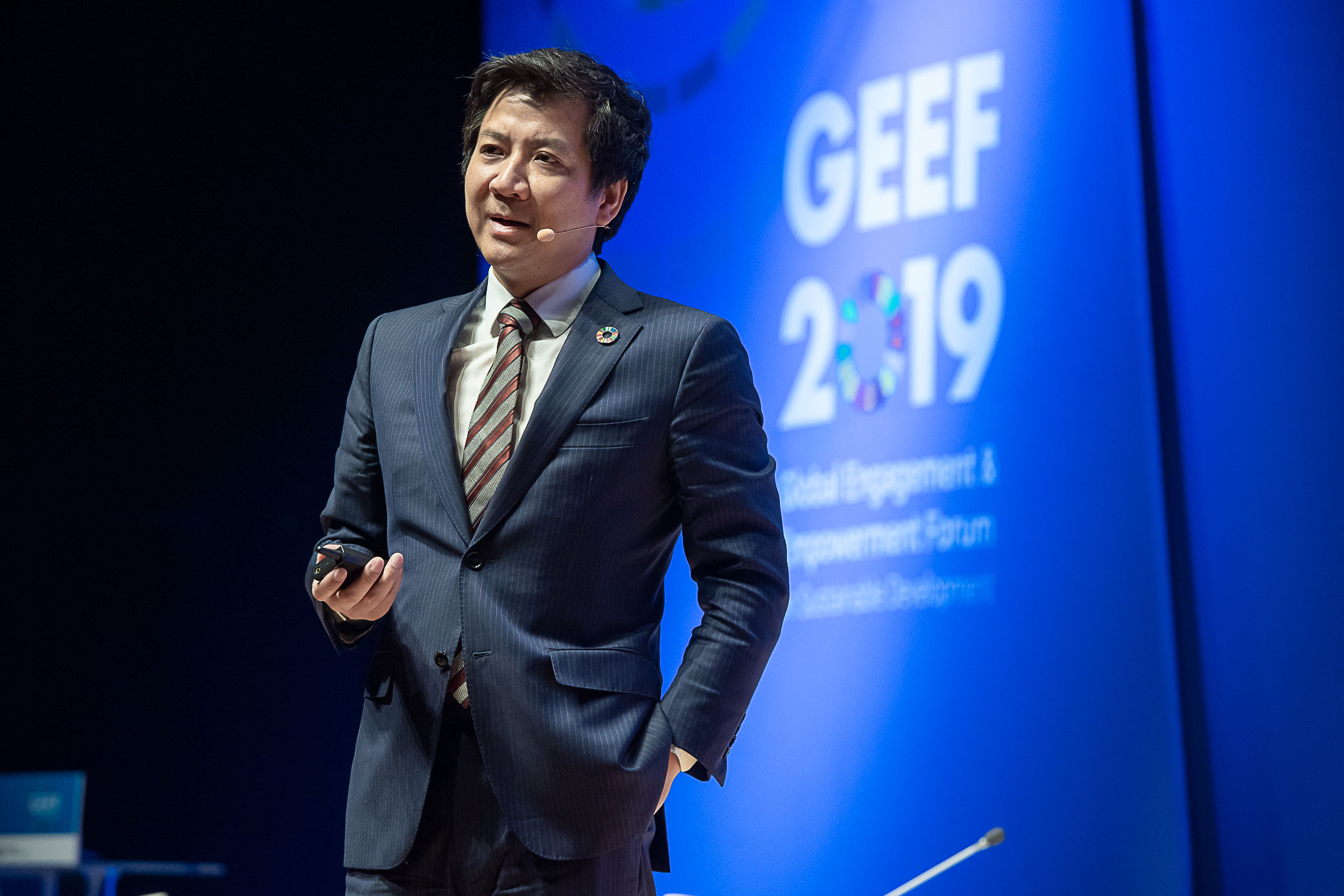 Michael Wen Zhang, President of SenseTime
Michael Wen Zhang, President of SenseTimeSee full video here.
Special Roundtable on Inter-Korean Economic Cooperation
To address further expectations of the inter-Korean relations and to discuss the significance of future economic cooperation for sustainable peace and co-prosperity in the Korean peninsula, Moon Chung-in, Special Advisor to South Korean President Moon Jae-in and Emeritus Professor at Yonsei University moderated a special roundtable session with representatives of the Korean National Assembly, academia, and media. The roundtable panelists discussed reasons why inter-Korean economic cooperation should continue as a catalyst for the development of the Korean economy as well as political and military unification.
“Above all, for inter-Korean economic cooperation to be sustainable it is necessary to understand the goals and conditions of North Korea and to establish a framework for solutions to issues such as denuclearization and international sanctions,” said Special Advisor Moon.
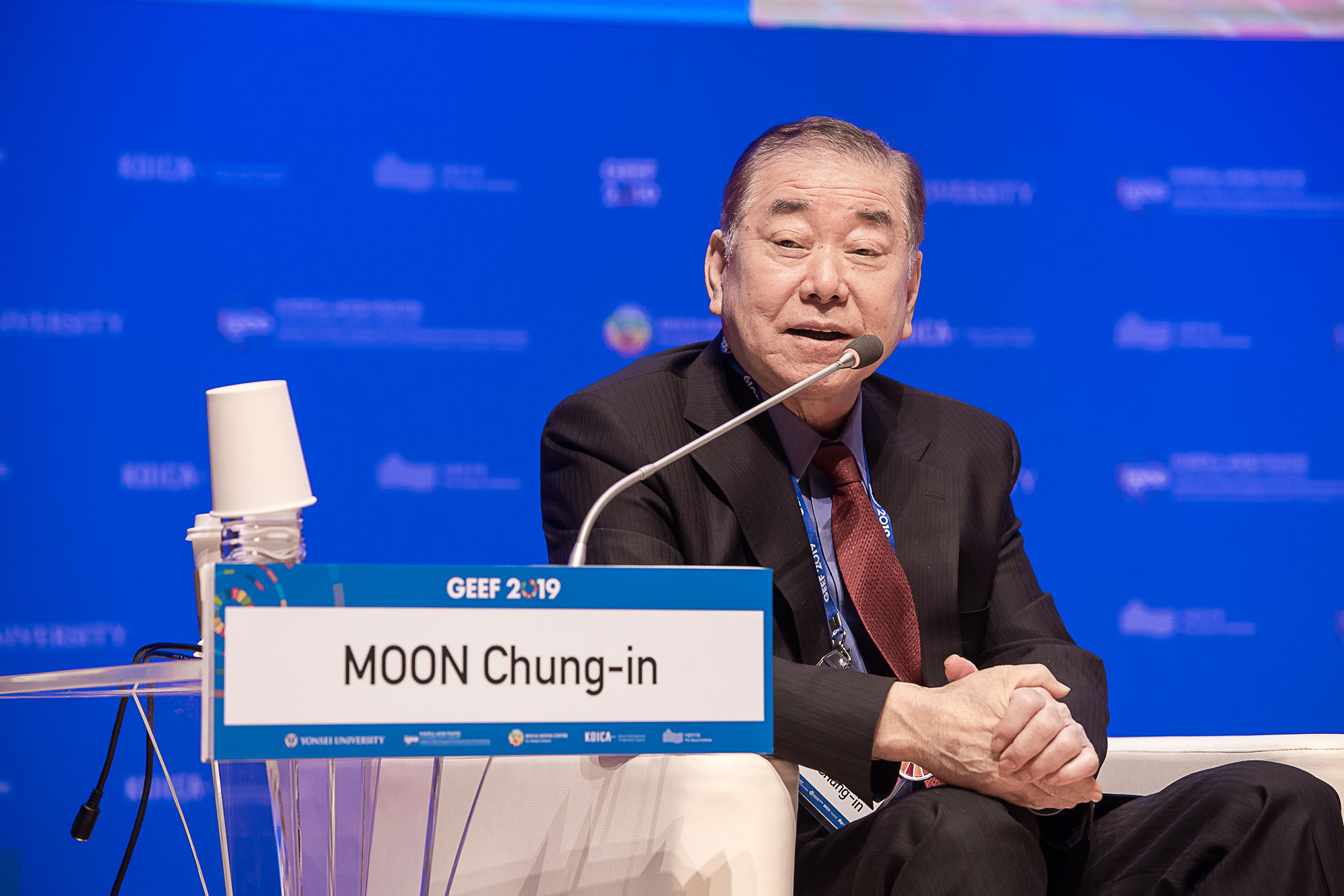 Moon Chung-in, Special Advisor to South Korean President Moon Jae-in
Moon Chung-in, Special Advisor to South Korean President Moon Jae-in
& Emeritus Professor at Yonsei UniversityLee In-young, Chair of the Korean National Assembly's Special Committee on Inter-Korean Economic Cooperation, remarked that the inter-Korean economic cooperation is a stepping stone for the Korean economy to rebound. "Now that the Korean economy is experiencing low growth, we can once again achieve medium growth through inter-Korean economic cooperation,” he said. “The social gap between the two Koreas is big, but if the North Korean economy improves through economic cooperation, we can prevent social conflicts in the case of unification.”
Ji Sang Wuk, another member of the Korean National Assembly, commented that denuclearization is an absolutely necessary prerequisite for the two Koreas to be united and to have economic cooperation, adding that political issues always follow economic cooperation. “Going beyond the ruling party and government, we should deliberate how to create cooperative authorities which will put the North-South Korean community in the spotlight of the political order in Northeast Asia,” he said, stressing that, “we need to accelerate this process.”
Kim Joo Hyun, President of the Korean daily newspaper Financial News, emphasized that for the inter-Korean economic cooperation to continue, the Koreas must recognize the economic situation that has changed domestically and abroad and set new goals accordingly. “The reason why the inter-Korean economic cooperation wasn’t sustained in the past 20 years was due to external factors spanning politics, military, and security, but above all, it was because the economic goals that the South and the North planned to achieve through economic cooperation differed,” he explained. “Now, inter-Korean economic cooperation should consider the changing labor market environment of North Korea - and what North Korea needs right now is not income. North Korea is currently building domestic industries as a replacement for imported goods, similar to South Korea in the late 60s, but it needs competitiveness to develop export industries,” he concluded.
See the full video here.
Parallel Sessions and Next Steps for GEEF
On the second day of the forum, GEEF 2019 featured 12 concurrent parallel sessions on various topics addressing issues of the global community within the framework of the SDGs, providing valuable insight on sustainable development and opening in-depth discussions among speakers and participants. Session topics included desertification in Northeast Asia and North Korea, children’s rights in conflict-affected areas, public-oriented medicine access and innovation, academia and partnerships for SDG implementation, university social responsibility, and youth participation to achieve the SDGs. Including the special ceremonies, plenary sessions, parallel sessions, and events, the total number of attendees during the two-day forum reached over 2,000.
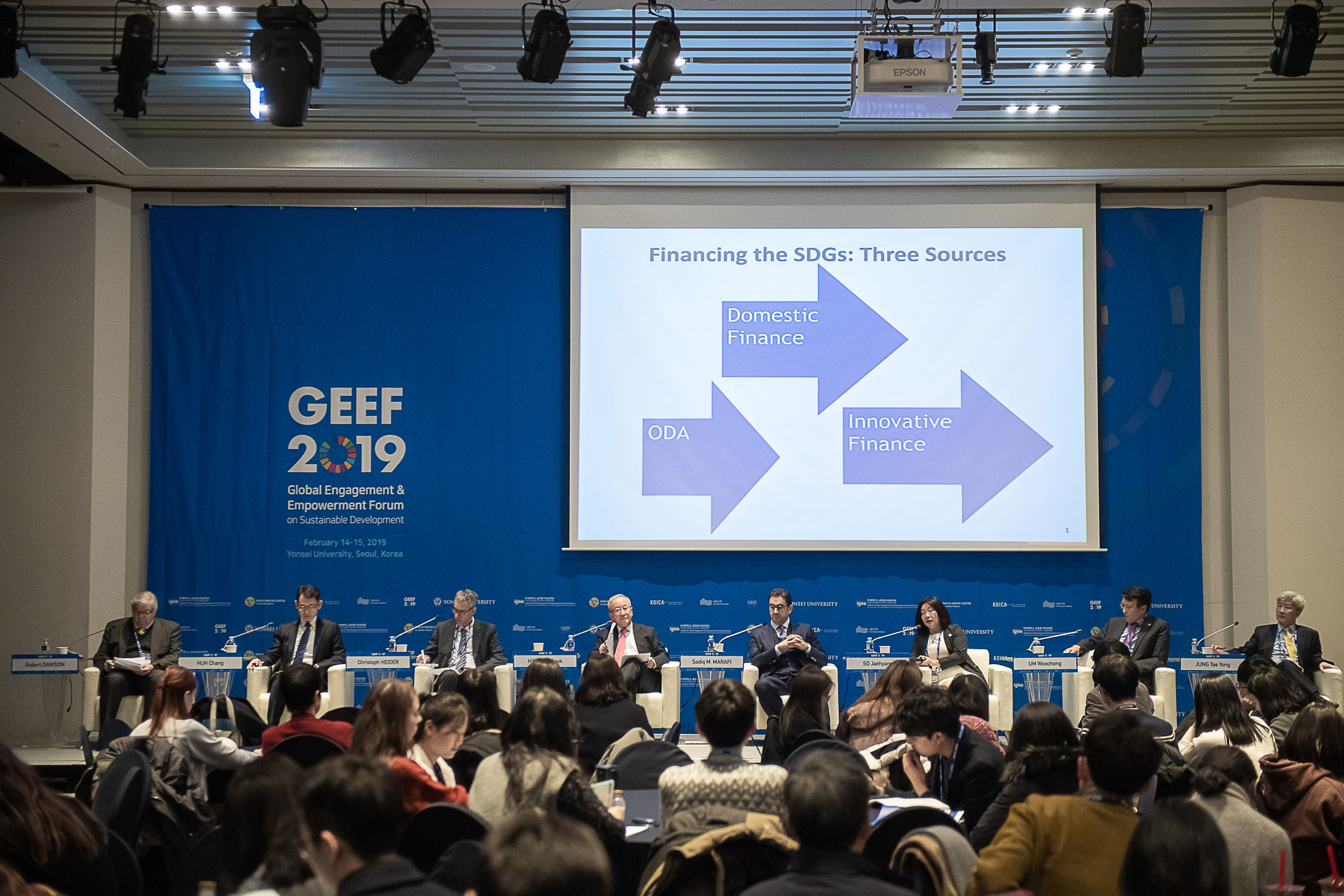
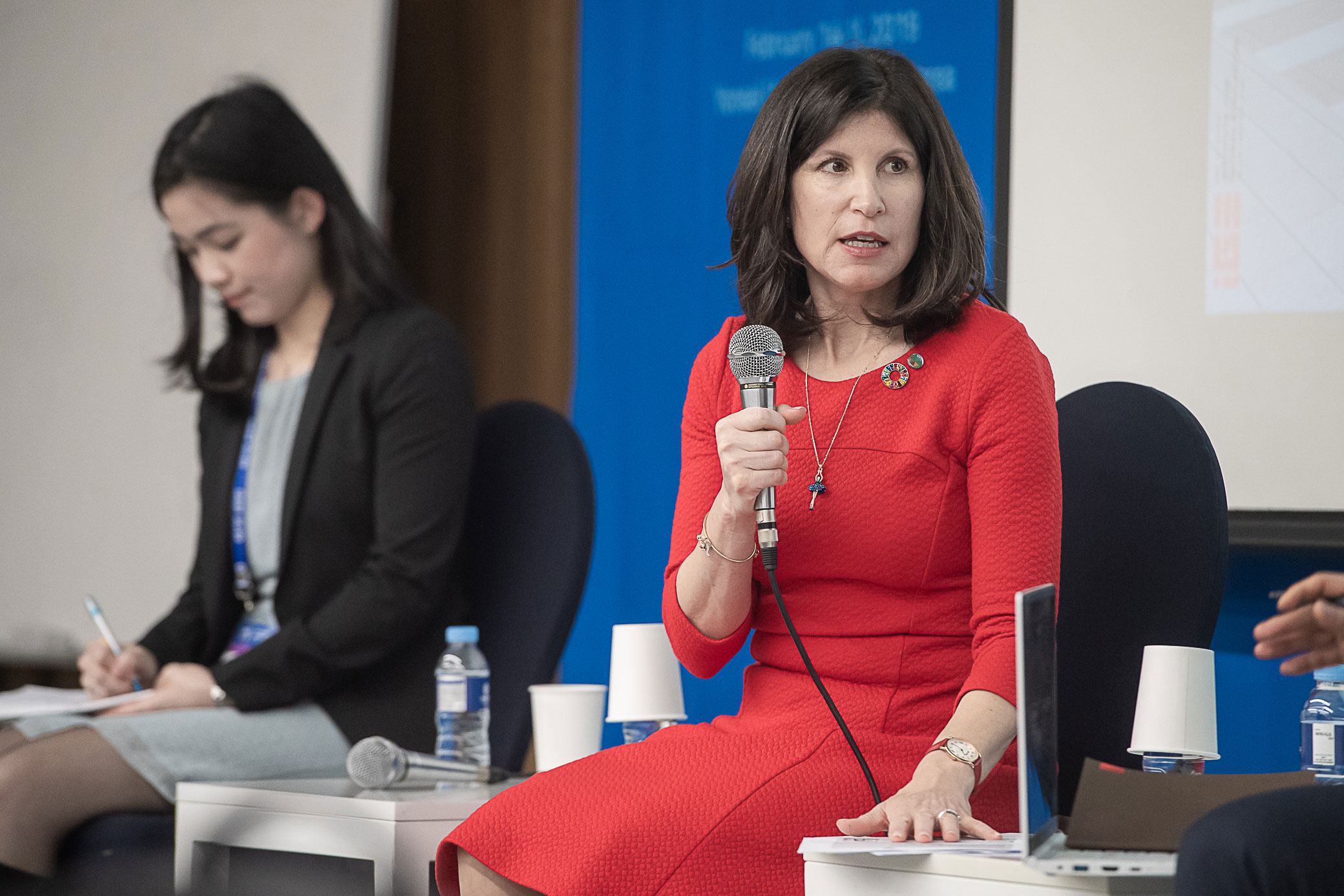
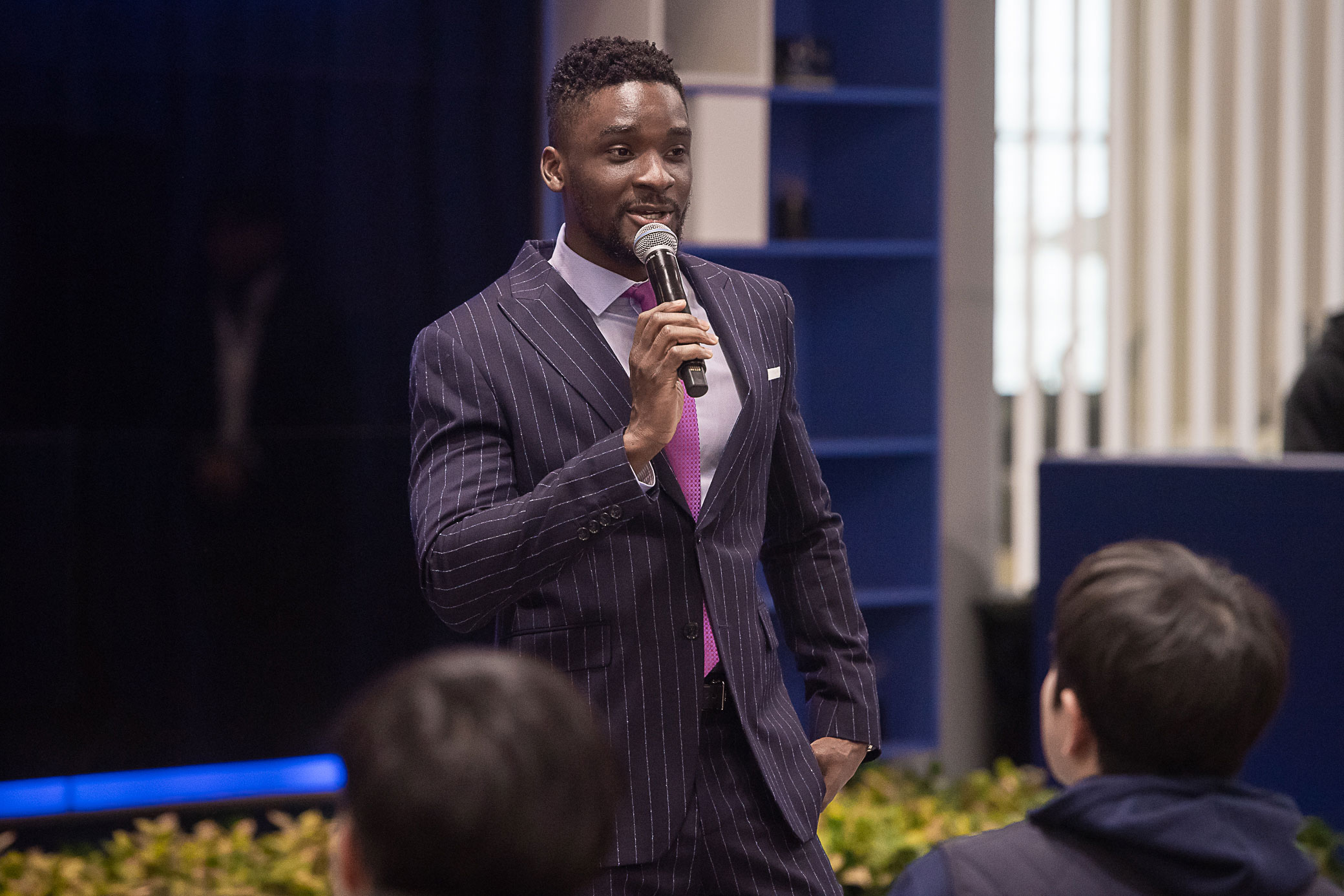
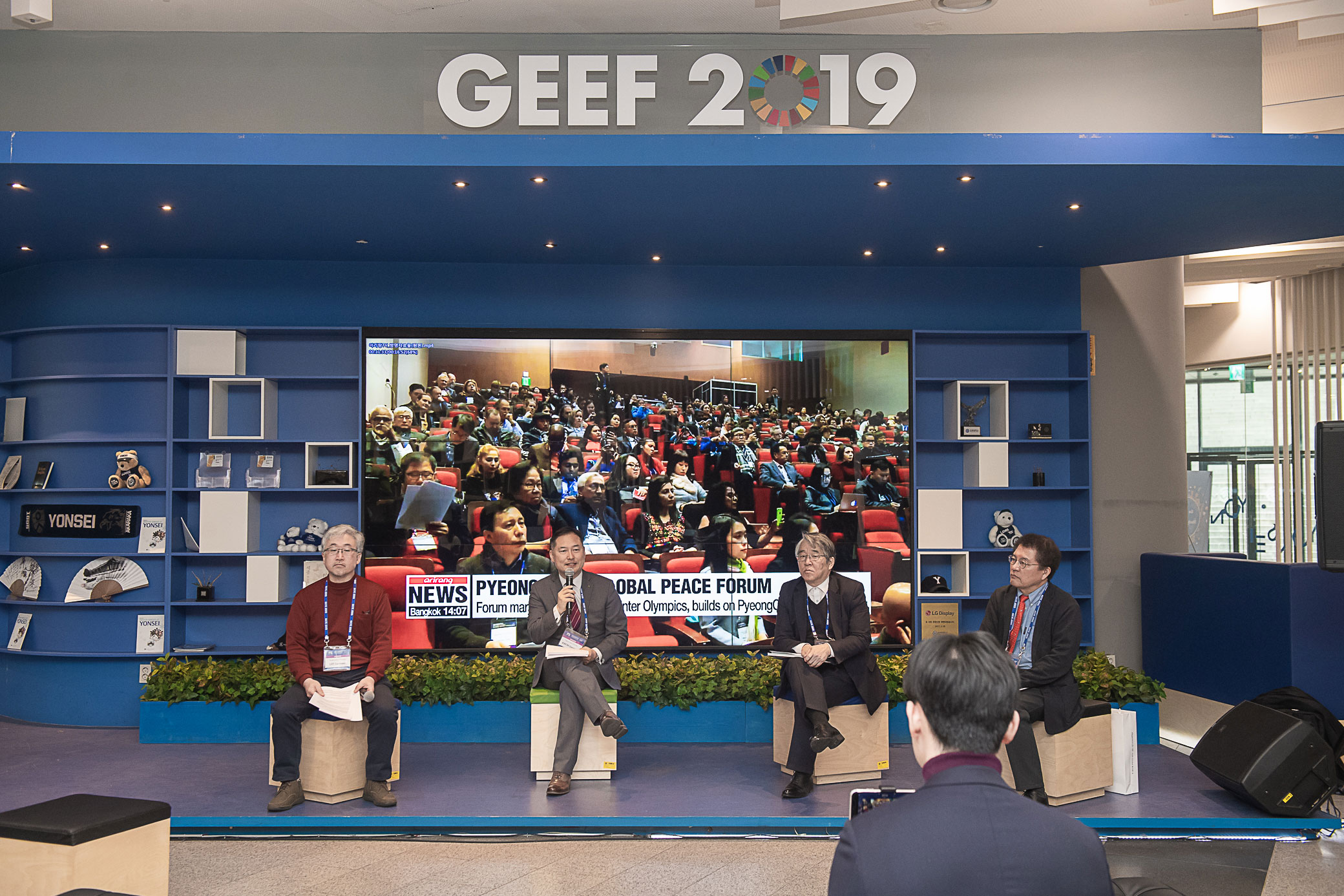
The GEEF Organizing Committee will continue to pursue substantial initiatives to achieve the SDGs. Firstly, the Global Movement Platform (tentative name) will be developed to promote SDG 5 on gender equality. Also, the School on Sustainable Development Studies will be launched as part of Academic Studies to raise awareness of our global challenges, advance the progress of SD education, as well as cultivating young global leaders of the future generation. These initiatives will be reported at GEEF annually.
show mobile menu
mobile menu

